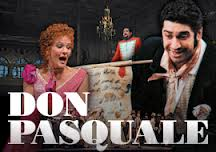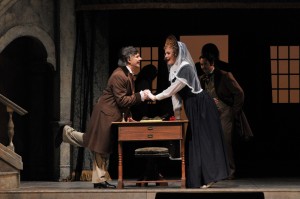D’ARCANGELO DONS A NEW LOOK
After presenting a successful string of tragic operas this season, Lyric Opera flexes its comedic muscles with a charming production of Gaetano Donizetti’s opera buffa Don Pasquale. Although this Bel Canto Era opera has been part of Lyric’s repertoire for almost 50 years, this is the first time they have used Jean-Pierre Ponelle’s 1977 production from Covent Garden in London (the production is now owned by The Dallas Opera). Though Ponelle’s ornate sets have worn a bit, they still perfectly reflect the style of mid-nineteenth century Rome and with Christine Binder’s magnificent lighting and the vivacious cast, they come fully to life again.
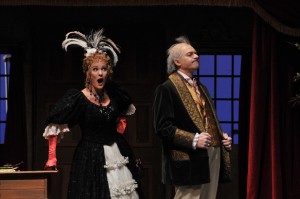 The aging Don Pasquale disapproves of his nephew’s choice of bride (the seductive, lower-class Norina), so as any cranky septuagenarian would do, he kicks his nephew out of the house, deciding to marry and start his own family. Fed up with Pasquale’s stubborn views, Ernesto’s friend Dr. Malatesta plots to trick the old man. Pasquale believes he is marrying Sofronia, the doting, mannered sister of Dr. Malatesta, but instead Norina has conspired with the sly doctor to act as his sister and once the marriage contract is signed (yet not official due to a sham notary), Norina tortures Pasquale with her insensitivity and spending habits until Pasquale concedes that marriage is not for him.
The aging Don Pasquale disapproves of his nephew’s choice of bride (the seductive, lower-class Norina), so as any cranky septuagenarian would do, he kicks his nephew out of the house, deciding to marry and start his own family. Fed up with Pasquale’s stubborn views, Ernesto’s friend Dr. Malatesta plots to trick the old man. Pasquale believes he is marrying Sofronia, the doting, mannered sister of Dr. Malatesta, but instead Norina has conspired with the sly doctor to act as his sister and once the marriage contract is signed (yet not official due to a sham notary), Norina tortures Pasquale with her insensitivity and spending habits until Pasquale concedes that marriage is not for him.
As the elderly Don Pasquale, Ildebrando D’arcangelo has traded his usual heart-throb status for a head feathered with thin, wispy white hair, and an unfit, protruding mid-section. But D’arcangelo’s leading man vigor has not waned. He flits around the stage with the lightness of a marionette, perfectly executing the well-chosen comic quirks of director Sir Thomas Allen, while his rich bass-baritone powers from him.
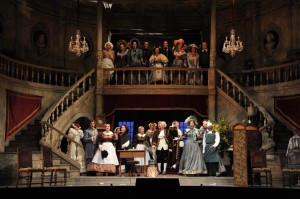 René Barbara (one of Opera’s rising-stars), plays Ernesto, the heart-broken nephew of Pasquale. His high tenor sweeps with soft authority around the theater and warrants the many accolades Barbara has recently received (Grand Prize winner of the Charles A. Lynam Vocal Competition, Grand Finals winner of the Metropolitan Opera National Council). Although one can’t deduce his newness to the scene, his acting could use some work. Next to veterans D’arcangelo and Marlis Peterson, Mr. Barbara comes off stiff and self-contained, unwilling to offer anything but his voice to the audience. In fairness, his character isn’t required to do much—he is just the rather passive axis around which all the other characters turn. Still, when Ernesto and Norina reunite at the end, there’s not much chemistry between the two, and after Norina’s energized duets with Pasquale and Dr. Malatesta, the emotional disconnect is all too clear.
René Barbara (one of Opera’s rising-stars), plays Ernesto, the heart-broken nephew of Pasquale. His high tenor sweeps with soft authority around the theater and warrants the many accolades Barbara has recently received (Grand Prize winner of the Charles A. Lynam Vocal Competition, Grand Finals winner of the Metropolitan Opera National Council). Although one can’t deduce his newness to the scene, his acting could use some work. Next to veterans D’arcangelo and Marlis Peterson, Mr. Barbara comes off stiff and self-contained, unwilling to offer anything but his voice to the audience. In fairness, his character isn’t required to do much—he is just the rather passive axis around which all the other characters turn. Still, when Ernesto and Norina reunite at the end, there’s not much chemistry between the two, and after Norina’s energized duets with Pasquale and Dr. Malatesta, the emotional disconnect is all too clear.
Marlis Peterson plays a strong and excitable Norina/Sofronia, a worthy adversary against the stubborn curmudgeon Pasquale. Donivetti’s light and see-sawing score requires frequent high soprano fluttering and Peterson repeats each instance with equal fun and fervor. Sparks fly as Norina and Pasquale duel in their duet “Signorina, in Tanta Fretta.”
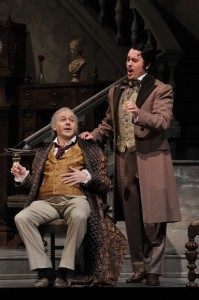 Corey Crider’s Dr. Malatesta changes a bit from act to act. Initially deceitful with ambiguous motives, he adopts a more cunning and playful air as time goes on. I think there’s an attempt by both Crider and Sir Thomas Allen to make Malatesta more nuanced than necessary, causing a bit of distraction. But despite that little confusion Crider’s talent is utterly clear and he won me over three-fold during his and D’arcangelo’s exhilarating and tongue-twisting duet “Cheti, Cheti, Immantinente.”
Corey Crider’s Dr. Malatesta changes a bit from act to act. Initially deceitful with ambiguous motives, he adopts a more cunning and playful air as time goes on. I think there’s an attempt by both Crider and Sir Thomas Allen to make Malatesta more nuanced than necessary, causing a bit of distraction. But despite that little confusion Crider’s talent is utterly clear and he won me over three-fold during his and D’arcangelo’s exhilarating and tongue-twisting duet “Cheti, Cheti, Immantinente.”
The closing scene in Pasquale’s garden is visually delightful. The age of the set gives an organic, weathered feel and the romantic lighting provides each singer an enchanting glow. But the end unfolds too quickly and the trite moral of the tale negates the rich themes at work throughout the show. Donizetti wrote Don Pasquale as homage to Commedia dell’arte, a style of theater that appeals to the masses, so a simplified message makes sense, but honestly, it was quite disappointing. After Norina’s strong show of feminism and the clear message that being poor or rich doesn’t matter as much as being kind and virtuous, Donizetti chose a strange moral to articulate: “Men past their courting years should not marry.” After the cruel (yet perhaps deserved) trick on Don Pasquale, it’s almost offensive when two servants usher the spry old man into a wheel-chair, implying that he should just give up and sit out the rest of his days.
But perhaps my anger at the ending is only a testament to how likeable and complex D’arcangelo plays his Pasquale. In the end, I don’t want Pasquale in a wheel-chair; I want him blustering around the stage in toupees, excitedly hiking his pants high over his belly, singing one last song. I want the show to start all over again.
photos by Dan Rest/Lyric Opera of Chicago
Don Pasquale
Lyric Opera of Chicago
scheduled to end on December 15, 2012
for tickets, visit Lyric Opera
for info on this and other Chicago Theater, visit http://www.TheatreinChicago.com
